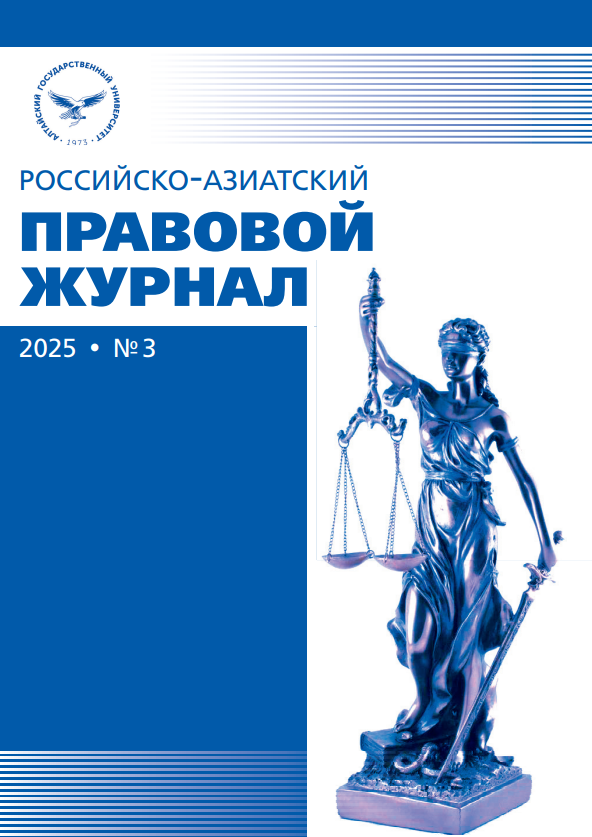CURRENT CHALLENGES AND THREATS TO INFORMATION SECURITY IN RUSSIAN SOCIETY AND LAW OF THE 21ST CENTURY
УДК 34:006.015.8 ББК 67.401.114
Abstract
The article examines the dynamic changes in the field of information security faced by the RussianFederation at the present stage, as well as analyzes the key factors shaping the threat landscape in the 21stcentury, including rapid digital transformation, geopolitical tensions and the evolution of cybercrime.The categories of threats are highlighted and characterized in detail: technological, socio-psychological,geopolitical and economic. Special attention is paid to the role of Russian law in ensuring information security,the characteristics of existing legislative acts and challenges in their practical application, and the directionsfor further improvement of the protection system are proposed.
Downloads
References
2. О безопасности критической информационной инфраструктуры Российской Федерации :Федеральный закон от 26.07.2017 № 187‑ФЗ. URL: https://www.consultant.ru/document/cons_doc_LAW_220885/ (дата обращения: 25.08.2025).
3. Об информации, информационных технологиях и о защите информации : Федеральный законот 27.07.2006 №149‑ФЗ. URL: https://www.consultant.ru/document/cons_doc_LAW_61798/ (дата обращения: 25.08.2025).
4. О персональных данных : Федеральный закон от 27.07.2006 № 152‑ФЗ. URL: https://www.consultant.ru/document/cons_doc_LAW_61801/ (дата обращения: 25.08.2025).
5. Об утверждении Доктрины информационной безопасности Российской Федерации : Указ Президента Российской Федерации от 05.12.2016 №646. URL: https://www.garant.ru/products/ipo/prime/doc/71456224/ (дата обращения: 25.08.2025).
6. О Стратегии развития информационного общества в Российской Федерации на 2017–2030 гг. :Указ Президента Российской Федерации от 09.05.2017 №203 URL: https://www.garant.ru/products/ipo/prime/doc/71570570/ (дата обращения: 25.08.2025).
7. Агапов А.Б. Основы государственного управления в сфере информационных технологий : учебник. М. : Проспект, 2017. С. 304.
8. Бачило И.Л. Информационное право : учебник. 3‑е изд., перераб. и доп. М. : Норма, 2017. С. 592.
9. Мамитов В.К. Правовое регулирование информационной безопасности: учебник для вузов.М. : Юрайт, 2022. С. 352.
10. Вайпан В.А. Правовое регулирование цифровой экономики в России: проблемы и перспективы // Право и экономика. 2021. №2 (396). С. 5–12.
11. Демидов А.В., Мальцев А.И. Киберугрозы как элемент гибридных войн: правовые аспектыпротиводействия // Право и кибербезопасность. 2020. №4. С. 12–18.
Copyright (c) 2025 И. А. Воронина

This work is licensed under a Creative Commons Attribution 4.0 International License.
Russian-Asian Law Journal is a golden publisher, as we allow self-archiving, but most importantly we are fully transparent about your rights.
Authors may present and discuss their findings ahead of publication: at scientific conferences, on preprint servers, in public databases, and in blogs, wikis, tweets, and other informal communication channels.
Russian-Asian Law Journal allows authors to deposit manuscripts (currently under review or those for intended submission) in non-commercial, pre-print servers such as ArXiv.
Authors who publish with this journal agree to the following terms:
- Authors retain copyright and grant the journal right of first publication with the work simultaneously licensed under a Creative Commons Attribution License that allows others to share the work with an acknowledgement of the work's authorship and initial publication in this journal.
- Authors are able to enter into separate, additional contractual arrangements for the non-exclusive distribution of the journal's published version of the work (e.g., post it to an institutional repository or publish it in a book), with an acknowledgement of its initial publication in this journal.
- Authors are permitted and encouraged to post their work online (e.g., in institutional repositories or on their website) prior to and during the submission process, as it can lead to productive exchanges, as well as earlier and greater citation of published work (See The Effect of Open Access).








